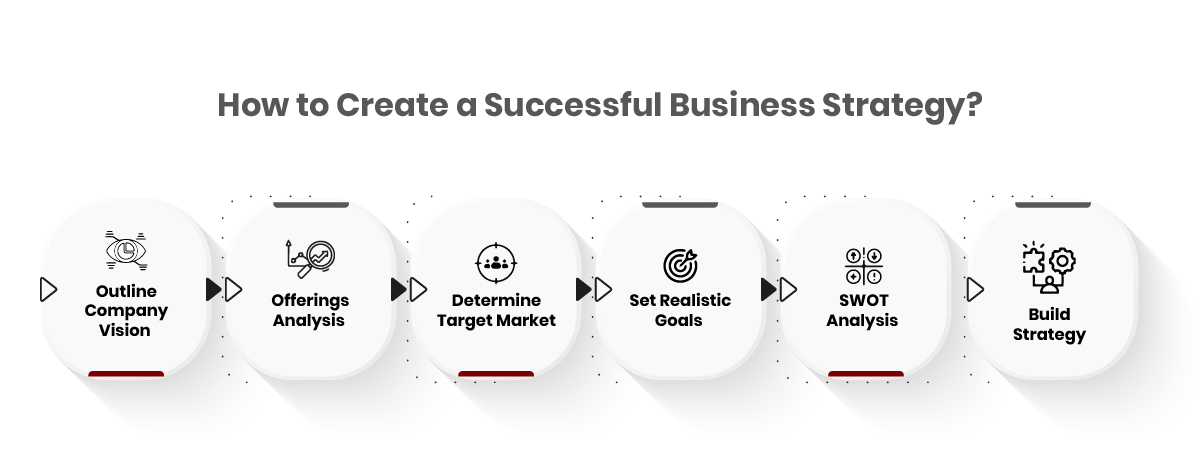Discover Types of Business Strategies for Your Organization
 November 09, 2023
November 09, 2023
Various studies and research concluded that companies with a robust business strategy have a 30% greater chance of recording phenomenal growth. A detailed business plan helps them identify their company’s strengths and weaknesses. This enables businesses to use their strengths, work on the weaknesses, and ‘double the organizational success ratio’.
A business plan helps the entrepreneur address several external and internal elements of the new business. This allows them to focus on relevant areas and develop a more comprehensive map to ensure business success. As per Demandsage , HubSpot Reporting & Analytics, the USA has been leading as the country with the greatest number of startups, which stands at 72,560. Also, the report infers that out of 150 million startups in the world, 90% of startups fail. Due to the absence of an effective business strategy, they cannot survive rising inflation, interest rates, intense competition, and more issues.
What does business strategy mean?
A business strategy is a tool to create a plan of action aligned with the business vision and mission to achieve organizational goals. The business strategy defines methods and tactics for making important organizational decisions. According to the chosen business strategy, the companies manage the work of different departments and ensure that the departmental decisions match the company's overall objective.
A business strategy includes analyzing the current situation, allocating resources, hiring new employees, monitoring the present working of departments, etc. The end goal may be achieving business expansion, capturing niche markets, augmenting the services or product line, entering newer markets, enhancing customer satisfaction, and many more.
What to consider when choosing a business strategy for your organization?
It is important to remember that what works for one doesn't mean it will work for another. There are many well-established and popular business strategies. You must meticulously choose the best business plan for your organization. To select the perfect business strategy that can take your company to new heights, ask yourself these questions:
- What type of business do I have?
- What are my business goals?
- What makes my business unique?
- What are my resources?
- What are the risks involved?
- What is the current status of my business?
- Who are my target audience/customers?
- Who are my competitors?
- What is the market size for my business?
- What are my future aspirations or growth goals?
These are many more questions that may be specific to your business. Keep in mind all these before starting to develop a strategy. You can only make a powerful strategy once you have clarity.
Types of Business Strategies
The most common types of business strategies include:
- Cost Focus Strategy
The concept behind this type of business strategy is to create a narrow market by playing on the price. Using this business plan, numerous companies have successfully beaten the market by offering products and services at a lower price compared to the competitors. However, lowering costs does not mean compromising the quality here.
- Growth Strategy
A perfect strategy for those business owners who want to enter a new market or expand their product features. They reach their target customers by strategizing unique marketing ideas.
- Value-Based Strategy
One of the most effective business strategies, the value-based business plan, is based on consumers' perceived value of products and services. Here, the pricing is not done according to the cost of production. Companies looking forward to offering advanced product and service features can go for this business strategy. Apple Inc. has been using value-based pricing comprising four aspects: willingness to pay, price, cost, and willingness to sell.
- Differentiation Strategy
A differentiation strategy is when a company introduces distinctive products and services. The customers consider the same as a unique experience and highly-valued products and services than the others available in the market. In this strategy, the companies often charge premium prices for their differentiated line.
- Price-Skimming Strategy
Price-skimming business strategy implies a higher price for the products and services at the beginning of the business. Usually, businesses that introduce something exceptional or new in the market can afford to go for this strategy, as they can get a higher price for their offerings. The advantages for the businesses include easy recovery of the initial costs and niche marketing of your product.
- Acquisition Strategy
Under the acquisition strategy, a business acquires or buys another business to increase growth. Here, the focus is not only on improving the sales and revenue of existing products or services. The main idea behind the acquisition strategy includes obtaining quality staff, additional products, accessing available funds or assets, achieving a wider customer base, increasing market share, etc.
- Competitive Strategy
A competitive strategy focuses on how the organization plans to deal with its competitors within the market. The company intends to achieve its business objectives by creating a competitive edge.
- Corporate Strategy
A corporate business strategy means fulfilling the business vision or objective. This strategy is focused on the core value fulfillment of the organization. The strategists consider questions like the organization's goal, what the stakeholders and vendors think about it, etc. Companies with expansion goals and wish to identify additional markets use this strategy.
- Functional Strategy
A business comprises various departments such as human resources, finance, marketing, sales, research and development, etc. In the functional strategy, the company looks forward to enhancing the productivity and developing skills of different organizational departments.
- Customer Focus Strategy
The businesses prioritize to increase customer satisfaction and retain them use this type of strategy. This is a great type of business strategy that allows the companies to understand the best tactics and campaigns, to augment customer experience and retention.
Tips to Implement a Business Strategy
Now that you have decided on one of the business strategies or created a new one, these tips will help you in its seamless implementation:
- Identify your target market and customer base: Your primary focus must be finding your target market and customer segment.
- Need recognition: Next, you must try to recognize the needs of your consumer base. Accordingly, you can create your selling plan.
- Finalize key metrics: After identifying the customers' needs, finalize pricing and logistics.
- Compare competition: Compare your pricing, profits, and growth with your main competitors and understand the scope for improvement.
- Align departments: All the departments must work towards the common goal – fulfilling the organization's objectives.
- Evaluate: Assessing and performing routine checks are important to ascertain your progress. Maintain a growth record and introduce ways to improve it.
How to Create a Successful Business Strategy?
Here is how you can create a successful business plan:

- Outline Company Vision
To outline the company vision, you must jot down your company's values, mission statement, and future goals.
- Offerings Analysis
Carefully analyze your products and services and find the value proposition. Identify what makes your products special and different. Know why they must buy them. This will help you create demand and stay ahead of the competition.
- Determine Target Market
Based on your products and services, determine your target market. Create segments based on gender, age, occupation, location, etc., and attend to each group's needs.
- Set Realistic Goals
What is your goal? Is it growing revenue, improving your brand, or something else? Have a long-term and short-term goal. Set benchmarks and deadlines.
- SWOT Analysis
SWOT analysis means identifying strengths, weaknesses, opportunities, and threats. This will help you strengthen your strengths, mitigate weaknesses, tap market opportunities, and address threats to ensure long-term success.
- Build Strategy
Firstly, create a strategy framework. This will include all the elements that support the overall business strategy. The elements like company culture, marketing plan, top management team, resources, etc. must be included in the business plan. Finally, implement your business strategy successfully.
Global Demand for Business Strategy
The importance of having a business strategy cannot be undermined, leading to its incredible demand in the market. A successful business can be built on a clear and effective strategy. The company should invest in market research and analysis to assess the demand. This will help them know market trends, drivers, and barriers. The political, economic, social, and environmental landscape also influences the demand for business strategy.
Successful multinational companies build their business strategy based on these parameters and work towards organizational growth. They know which markets to enter, what products to offer, and how to optimize the resources. They perform tasks effectively and align their functions with the business objectives.
Conclusion
A strategy that defines an organization's vision, goals, growth prospects, etc., tremendously helps the companies make wise decisions. Identifying key elements like target customers, competition, strengths and weaknesses, market needs, etc., can be challenging. But with an efficient business strategy, the companies can succeed, and the leaders can create value for their brand in the market.


